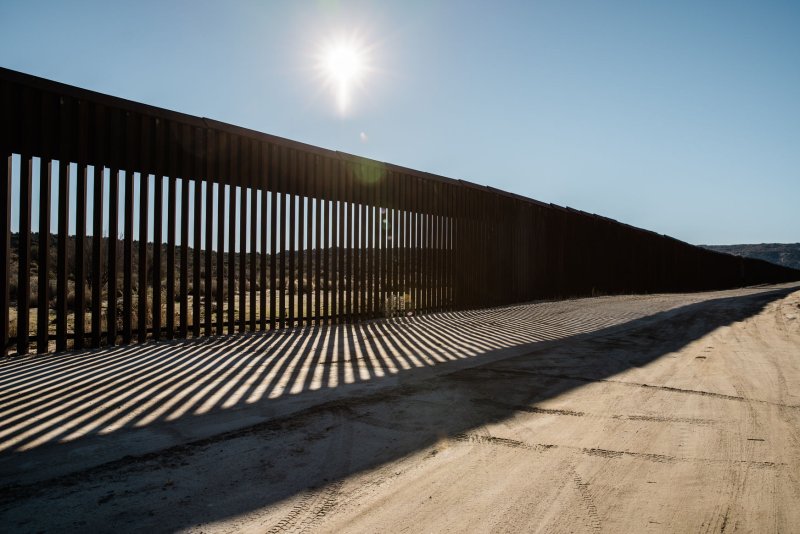Democrats are correct in that border security, not a wall, is needed. File Photo by Ariana Drehsler/UPI |
License Photo
The partial federal governmental shutdown in America is entering its fourth week -- the longest shutdown in our history.
The battle lines are drawn. President Donald Trump is betting his presidency on forcing congressional Democrats to fund his "wall" with Mexico. While superimposed on a $4.4 trillion federal budget, the $5.8 billion requested by the president for this barrier hardly qualifies as change. Yet, to paraphrase Oscar Wilde's quip about the pettiness of academic life, because the stakes are so small in dollar terms, the politics have become so sharp.
Clearly, the president is honoring his campaign promise "to build a wall and make Mexico pay for it." Of course, the wall is a metaphor for border security. Unfortunately, for whatever reasons, the president refuses to accept that metaphor even though his definition of "wall" may be changing.
As for Mexico paying, that was absurd from the start. While the revised NAFTA, still to be approved by the U.S. Senate, is being used as a surrogate for payment in that the benefits, according to the president, will amount to Mexican pesos for the wall, only the true believers will accept that falsehood. The real reason for the president's obstinance is that to govern, he needs his base of about 30 percent of voters. Fellow travelers who support that base perhaps add another 10 percent. With this 40 percent approval, the president has sufficient political capital to dominate politics. The wall is vital to maintaining his base.
Democrats are correct in that border security, not a wall, is needed. Further, the notion of a national security crisis on the southern border is as bogus as Mars attacking Earth. By every measure, that border is more secure today than in the past. The same cannot be said of the borders with Canada, through which more watchlist terrorists can flow, and the enormous sea coasts that have tens of thousands of unprotected and unsecured miles that are potentially far more vulnerable than the nearly 2,000-mile boundary with Mexico.
The tragedy is that the shutdown was caused by the failure to govern by both sides, although the president deserves the lion's share of responsibility. Some 800,000 government employees and possibly a million or more contractors and workers depending on government for their daily living are being held hostage in this fight. None of this is fair. But fairness seems to have been dropped from the American political lexicon.
The fundamental problem is the United States needs bridges not walls to ensure its future security. One can argue that in the past, walls may have offered protection. China had the Great Wall. But that wall was impotent against foreign "barbarians" who seized huge swaths of China's coastal cities and imposed great demands that today are not forgotten in Beijing.
The Soviet Union erected the Berlin Wall that proved ultimately ineffective. States such as Israel have used walls, as did the United States for a time in Iraq during the 2007 surge to reduce the violence. That latter proved temporary. And the former, it can be argued, is worsening the Arab-Israeli-Palestinian crisis.
The United States needs sensible border security. That relates back to immigration reform, among other issues. As long as the immigration quandary remains unresolvable, border security will be a bridge too far, no matter what sort of obstacles may be erected on the Rio Grande and the Mexican border.
What is needed is building bridges. Much of the forced migration is caused by violence, crime and instability in Latin America. Here bridges must be built with Mexico and the more stable regional states, as well as with the Organization of American States and the U.N. But what is being done here? The answer is very little.
Similarly, the Trump "America first" policies are demolishing too many bridges between the United States and the international community. Rejection of the Transpacific Partnership; the Paris Climate Accord; the Joint Comprehensive Plan of Action with Iran; and links with our closest allies in NATO is part of this bridge burning. And embarking on trade wars with allies and with China in erecting tariff walls that, as with the Mexican border, will prove unworkable.
Can our system of government, created by the best minds of the 18th century, weather the political tsunamis of the 21st century generated by hyper-partisanship on both sides of the aisle? A key indicator of where we are headed is clear. Will the United States attempt to build more walls with the outside community? Or will bridge-building return as a means to enhance prosperity and peace? Stay tuned. And prepare to be disappointed.
Harlan Ullman is UPI's Arnaud de Borchgrave Distinguished Columnist. His latest book is "Anatomy of Failure: Why America Has Lost Every War It Starts." Follow him @harlankullman.















